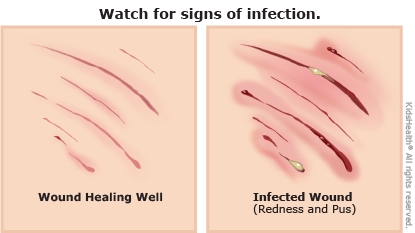Your child was bitten or scratched by an animal. Your health care provider cleaned the wound. No stitches were needed. You can now care for your child at home. It's important to follow your health care provider's instructions so that the wound doesn't get infected.


To help prevent infection:
Follow your health care provider's instructions for:

Your child:
You know your child best. If your child has symptoms that worry you or seems very sick, call your health care provider.

What problems can happen from an animal bite or scratch? Sometimes the germs that animals have in their mouth and claws can lead to infection. Most of these infections are easily treated with antibiotics. Rarely animal bites or scratches can lead to serious illnesses, such as rabies or tetanus. Your health care provider determined that your child is not at risk for rabies. If needed, your health care provider gave your child a tetanus shot.
What else should I know about animal bites? After a child is bitten by an animal, they may be very afraid of animals and want to avoid them, have nightmares, or show other signs of stress. If you are worried about your child, call your health care provider.
How can we prevent animal bites and scratches? To avoid animal bites and scratches, teach your child to:
If you own a pet, make sure it's up to date on all shots.